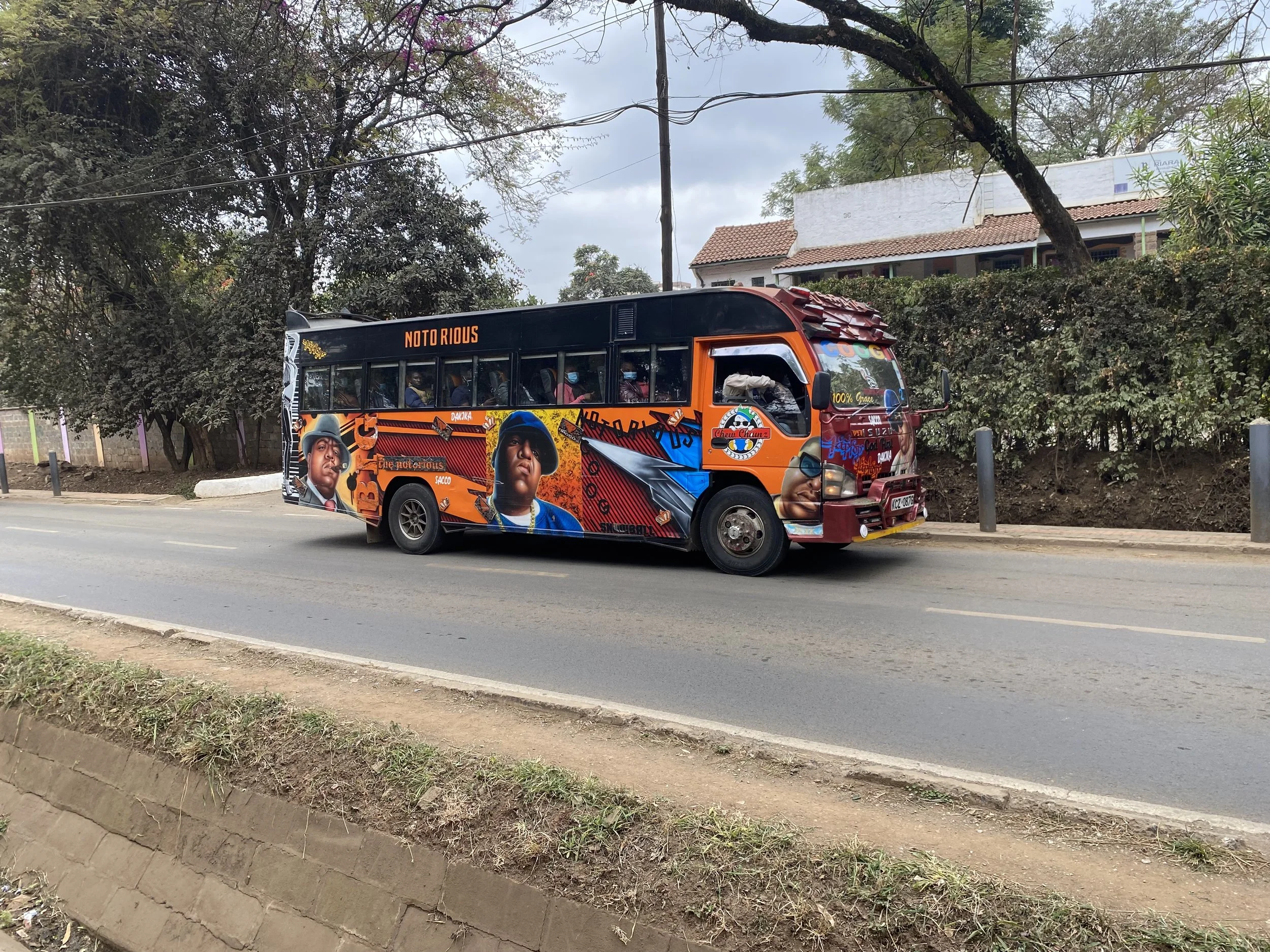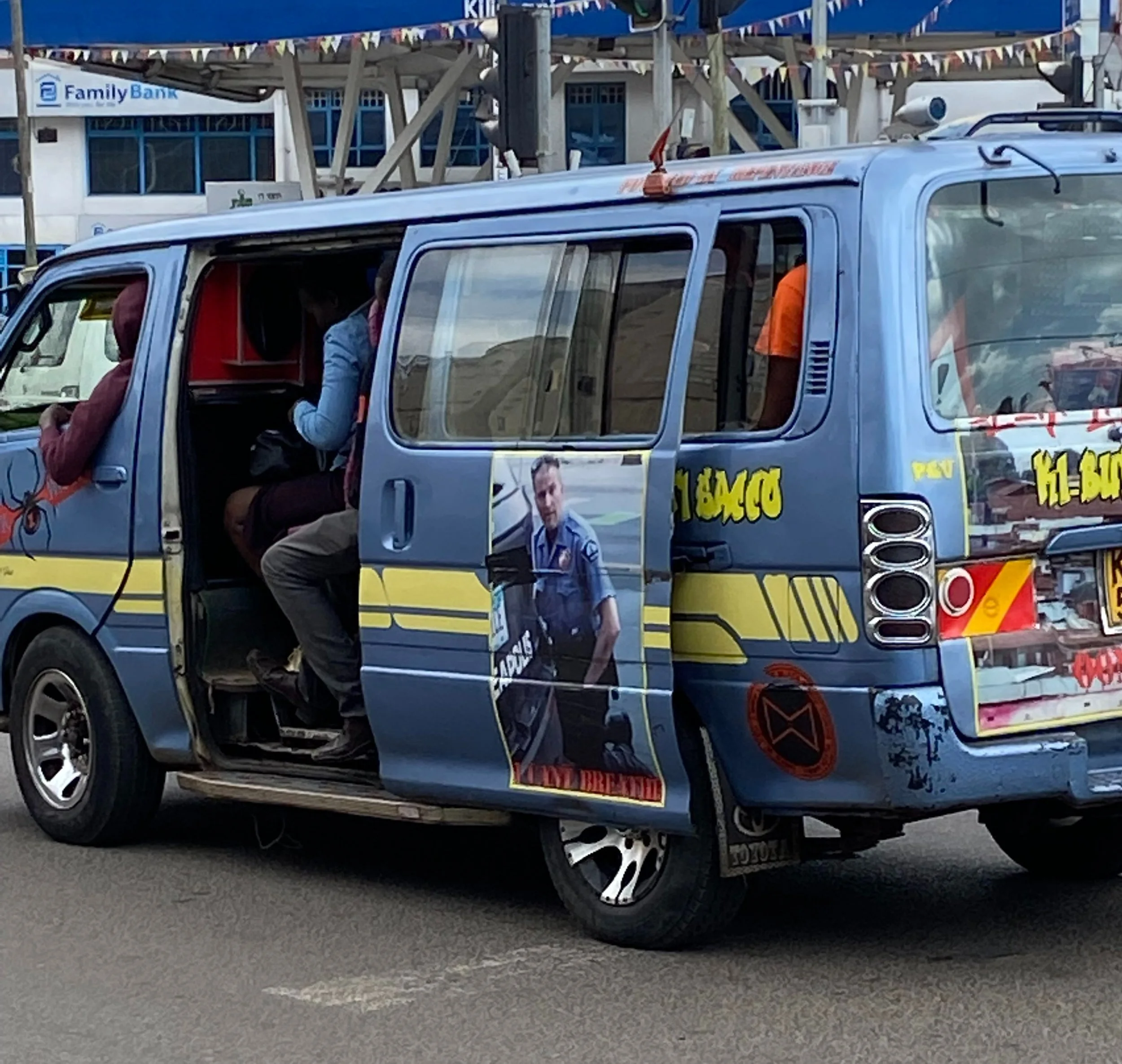How to be cool and impress your girl in Nairobi: Ride a matatu
Daniel (while reversing up the ~50M driveway of my apartment complex): “I love driving in reverse more than anything.”
Luke: “Really? Why?”
Daniel: “I used to drive matatus in CBD (1), and that driving is so crazy. Driving in reverse is so easy.”
Matatus make up the bus system in Nairobi. Ranging from nondescript white minivans to school-bus-sized machines painted with marijuana leaves and blasting reggae, matatus are the probably most common means of commuting for Nairobians.
Standard-issue Biggie ganya
I’ve always been fascinated by how the matatu system works - people often talk vaguely about them being connected to organized crime - so I had to pick Daniels’ brain for the 20-minute duration of our Uber ride together.
Some ganyas are more saintly, like this hardcore St. Michael the Archangel
The most fun matatus are the “posh” matatus as Daniel called them - the ones with paintings of rappers or movies or saints or Squid Game characters.
These Matatus are called ganya, and Daniel assured me I would instantly be cool if I told my girl we were taking a ganya around town (3)
The hottest ganya that Daniel drove was the Vybz Kartel matatu (video example here), which blasts reggae music and required him to continuously hit the airhorn button on his sound effect switchboard
A government regulatory agency has to approve the paintings on ganya, and - as an example Daniel gave me - they likely wouldn’t approve one with naked ladies because “school children might be riding this”
It was alarming and a little upsetting to see this bus protesting police violence with a picture of Derek Chauvin kneeling on George Floyd’s neck
The basics of the business work like this: A matatu owner pays for the right to drive on a particular route (4). Every day the owner hires a driver, and the driver’s job is to return the matatu at the end of the day with a full tank of gas and with ~10,000 Kenyan shillings (around $90).
The driver collects fees all day from passengers (5), and pays for his (6) day-to-day costs himself (fuel, paying a guy who hangs out the door on the side of the matatu and stirs up business, and bribes for cops (7)).
Economically, the business set up of matatus has a few interesting results:
Drivers are incentivized to get as many customers as possible - your pay as a driver is directly proportional to the number of customers
The driver has no guaranteed minimum income. If he only makes 10K in a day, he doesn’t make any money. If he doesn’t make enough to pay the owner, he has to convince the owner that there were riots that day, or crazy traffic or some other excuse. “Matatu drivers are very clever” says Daniel
Daniel said the reason he drove Uber now was because Uber guaranteed a minimum income - predictability is often more important than high average pay
Matatu drivers are “in the same company as the police” so can break traffic laws. Because of standing arrangements with cops, matatu drivers pay way less in bribes than a typical traffic driver who breaks traffic laws, and they drive with relative impunity
Cops look out for the matatu drivers. As Daniel kept saying, the cops and the matatu drivers are “all the same company.” Sometimes, to cajole the policemen, matatu drivers even wear blue uniforms, similar colors to the cops, and say “look, we wear the same uniform we’re the same.”
If you can make the cops laugh, they let you off easier (8)
There’s a lot more to learn about the matatu world - most specifically how exactly organized crime, politicians, and SACCOs fit together, but I’m happy to at least have learned a day in the life of a matatu driver.
As my friend from Maryland said “Kenyans have good taste”
—
Central Business District - downtown Nairobi
From my understanding, the matatu cartels (3) keep competition off their routes. I’m not sure if this is through legal or illegal means, but in any case it’s corrupt.
Note that I have not yet actually ridden a matatu, so I am not cool and have not impressed my girl
These cartels are connected somehow to SACCOs. Generally a SACCO is Savings and Credit Cooperative Organisation, a sort of community bank but they seem serve a variety of different purposes in different industries. Matatu SACCOs are openly known to be corrupt and connected to organised crime, though exactly how the crime part of things works it works is still unclear to me.
It seems like matatu fares are set by the owner or the SACCO
I have never seen a female matatu driver
Bribes for cops are an unavoidable cost of doing business, and break down into two main categories:
In the mornings, cops will stand near the roundabouts and stop matatus who each pay them around 100 shillings (~$0.90)
Later in the day if you get stopped for driving around traffic you pay around 100-200 shillings (~$0.90-$1.80)
Daniel claimed that even now that he was an Uber driver, if he got pulled over he would be able to talk his way out of a fine because the cops would tell he used to be a matatu driver
—
Source: Daniel The Matatu Guy
Thanks to J for convincing me that readers probably weren’t as interested in the financial side of things as I was



